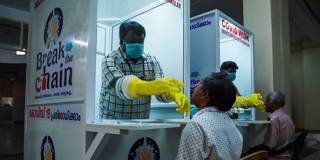It is no accident that the southwestern Indian state of Kerala has fared better than many others in the COVID-19 crisis. The state has a long tradition of investing in its people and institutions, and of fostering a civic and political culture of mutual respect, trust, and compassion.
NEW DELHI – As India’s 1.3 billion people struggle to cope with the COVID-19 pandemic, one of the country’s 28 states stands head and shoulders above the rest. Kerala, in southwestern India, has been so successful in “flattening the curve” that many now speak admiringly of a “Kerala Model” for handling public-health emergencies.

NEW DELHI – As India’s 1.3 billion people struggle to cope with the COVID-19 pandemic, one of the country’s 28 states stands head and shoulders above the rest. Kerala, in southwestern India, has been so successful in “flattening the curve” that many now speak admiringly of a “Kerala Model” for handling public-health emergencies.